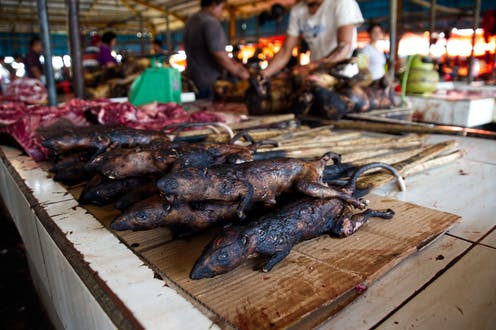
Happy Auer/Shutterstock
There have been widespread calls for a global ban on the sale and consumption of wild meat. Following the spread of COVID in early 2020 (which is thought to have originated in bats), over 200 conservation organisations signed an open letter to the World Health Organization, urging a permanent ban on all live wildlife markets and the use of wild animal products in traditional medicine.
The risk of disease spillover has been used by conservationists to legitimise arguments about the perceived need to separate humans from “wild” nature. Since the pandemic began, bans on wild animal consumption and trade have been introduced in several countries. Before COVID, bird flu and Ebola virus outbreaks also triggered bans on wildlife trade and consumption in northern Vietnam and west Africa, respectively.
By restricting contact between humans and wild animals, such bans should in theory minimise the risk of future disease outbreaks. Yet these restrictions neglect their potential impact on rural and Indigenous groups, who often depend on wild produce, particularly meat, fish and insects, as sources of dietary protein, fat and micronutrients.
Our previous work has documented the importance of “wild foods” worldwide. And we continue to find evidence that wild meat plays a critical role in enhancing the diets of Indigenous groups, such as Khasi communities in Meghalaya, northeast India. (To be clear, we’re not in any way promoting the consumption of endangered animals, which is strictly prohibited around the world.)

gregorioa/Shutterstock
Understanding spillover events
For our latest review, we extracted evidence on “spillover events” (the transmission of a pathogen from an animal to a human) linked to wild meat consumption and related practices (such as hunting and butchering), from available scientific papers published between 1940 and 2021. We found such evidence to be limited and often of poor quality.
Of course, there are risks to eating wild meat, but we need to better understand the specific consumption behaviour and practices that give rise to disease so that we can devise more targeted approaches to mitigate future outbreaks.
There is a risk that castigating wild meat harvesting practices in low-income settings fails to recognise the risks of zoonotic diseases (diseases that can be transmitted from animals to humans) associated with western food production and consumption practices.
We found that the highest number of spillover events reported in the scientific papers were from the US, and these were primarily linked to recreational hunting. While there are probably spatial biases in reporting (in some places, diseases may go undiagnosed or be under-reported), elsewhere, research has suggested that only 3% of emerging infectious diseases from 1940 to 2004 were attributable to wild meat, compared with 17% from conventional agriculture and the food industry. And 31% was linked to changes in land use, including deforestation and habitat fragmentation.
We highlighted specific mechanisms that appeared to heighten spillover risk from wild meat harvesting and consumption, such as involvement in hunting or wild meat preparation, including skinning and butchering. Cooking methods also mattered, with the consumption of raw or undercooked meat often mentioned in reports.
Towards more targeted policy responses
Our research suggests the need for more nuanced approaches to protect an increasingly globalised and interconnected world from the potential risks of zoonotic spillover while not stigmatising the consumption practices of communities that rely on wild resources.
Knowing which animals harbour disease, knowing who is most exposed to high-risk animal species, understanding seasonal changes in exposure, and disseminating an understanding of safe and unsafe hunting and cooking practices could be more effective than total bans, and may result in better adoption of protective behaviour.
Simply banning wild meat consumption stigmatises consumers and risks pushing consumption practices underground, where they become harder to understand and regulate.
With the rate of emergence of new diseases accelerating, there is a need for more inclusive approaches, which balance the vulnerabilities of diverse, local communities and their continued need for wild food sources, with the need to reduce the risk of future spillover associated with eating wild meat.
![]()
The authors do not work for, consult, own shares in or receive funding from any company or organization that would benefit from this article, and have disclosed no relevant affiliations beyond their academic appointment.























